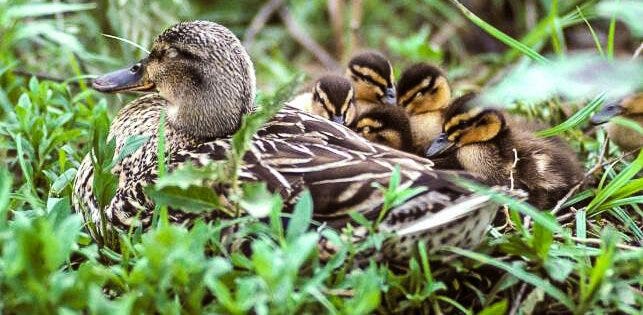Drought conditions hurt duck breeding
Waterfowl numbers are going to dip due to a lack of water. The North Dakota Game and Fish Department recently released the findings of their 74th annual breeding duck survey, and the results are not good. They found the number of breeding ducks below average. They blame it on the drought.
According to a recent press release from Ducks Unlimited, North Dakota’s May water index was down 80 percent from 2020, and nearly 68 percent below the 1948-2020 average in the state.
“These weather conditions are an early indicator of the broader drought across the North American prairies. And while these survey numbers and behavioral observations are sobering and indicate a decline in duck production in North Dakota, we must keep in mind that periodic drought on the prairies is a normal part of the climate cycle,” said Ducks Unlimited (DU) Chief Scientist Steve Adair. “While the drought persists, these periods allow wetlands to recycle nutrients and re-vegetate, setting the stage for a boom in populations when water returns.”
Drought conditions affect waterfowl in numerous ways. Reduced breeding is one of those ways. If conditions are bad enough, ducks won’t nest at all. They’ll leave the breeding grounds to find more stable wetland conditions.
“We’ve benefitted from above-average moisture on the breeding grounds for more than two decades, and this drought is a difficult, but necessary, part of the prairie climate cycle,” said DU Chief Conservation Officer Karen Waldrop. “Ducks Unlimited will continue our on-the-ground habitat work across North America to sustain waterfowl during tough times and to set the stage, so when the water returns to the prairies, waterfowl of all species will be able to get back to the record-setting populations we have seen in the recent past.
Wetlands are critical for waterfowl. When we experience periods of natural strife for wildlife, as this drought is for waterfowl, we see the critical importance of conserving habitat. Organizations like Ducks Unlimited lead the way in protecting such areas. For example, Ducks Unlimited and partners, including Pew and First Nations, have played a huge role in protecting 950 million acres in the Boreal Forest in the last 20 years. Areas such as the Boreal provide stability during a drought. This is why you should support such organizations if you care about their mission.
Because on the flip side, writing this article about the critical importance of wetlands at a time when the State of Indiana just passed legislation to degrade protections on the few remaining wetlands in the state, leaves me shaking my head in disbelief and a sadness in my heart. As humanity continues to influence climate change, bringing about these larger swings in weather events, like periods of severe flooding followed by severe drought, and we watch the impacts on wildlife and wild places, we still show through legislative action our society remains so greedy we’ll lift regulations on what little habitat remains for waterfowl.
I don’t know who the very rich person is, or the group of rich people, celebrating this new legal ability to destroy wetlands in Indiana, but they certainly exist. No one woke up and thought wetlands need not exist. A wetland or wetlands stood in the way of someone making more money, so they had to find a way to get rid of the regulations. So they bought some lawmakers with the power of their wealth. I imagine it wasn’t too hard to find a few state legislators more concerned with where the next donation is going to come from than they are about the number of ducks that are not going to be born this year due to a lack of habitat. Shame on them.
See you down the trail…
For more Driftwood Outdoors, check out the podcast on www.driftwoodoutdoors.com or anywhere podcasts are streamed.
Brandon Butler is a syndicated outdoor newspaper columnist and freelance magazine writer. His column, Driftwood Outdoors, has appeared in over 50 different newspapers and magazines, and currently runs in over 30 publications. He has won many awards for his outdoor communication work.
Butler has established himself as a conservation and outdoor media leader of his generation. He is currently Director of Communications for Roeslein Alternative Energy, a renewable natural gas company dedicated to conservation. He spent five years as the executive director of the Conservation Federation of Missouri. He created and taught Conservation Communications at the University of Missouri.
Butler is actively involved in conservation organizations. He is a life member of CFM, NRA, Boone & Crockett Club, Trout Unlimited, Fly Fishers International and Missouri Hunting Heritage Federation. He holds a B.S. in Organizational Leadership from Purdue University, a M.A. in Organizational Leadership from Gonzaga University and is currently completing an Executive M.B.A. at the University of Missouri.




